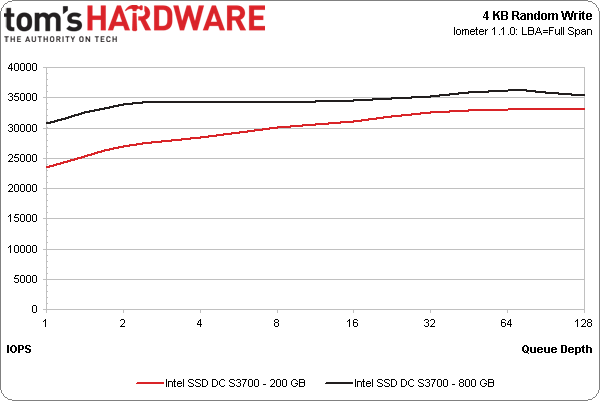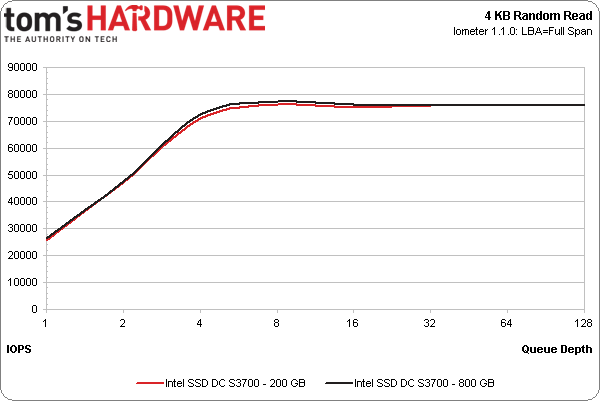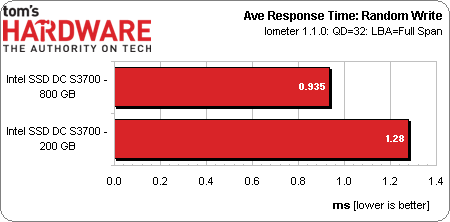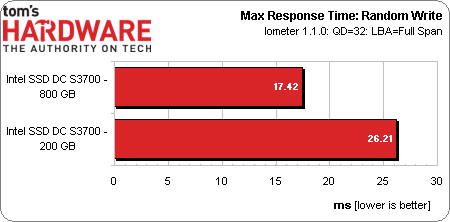Intel SSD DC S3700 Review: Benchmarking Consistency
With the recent announcement of the SSD DC S3700, Intel is firmly targeting enterprise customers with something not normally seen on spec sheets: performance consistency. Will their latest offering live up to expectations, or fall short? Lets find out.
Results: 4 KB Random Performance And Latency
As you can see, the SSD DC S3700 offers good performance in random 4 KB reads and writes. Both capacities achieve their specifications or slightly exceed them at reasonably-low queue depths. You won't see the performance levels of a desktop drive based on a second-gen SandForce controller (a theme you'll see throughout our tests), but this still represents a significant step up from Intel's previous generation of enterprise-oriented SSDs.
Indeed, Intel claims to trade best-in-class throughput for consistency and low latency. Let's have a look at the latency tied to these results to gauge the true impact of the company's optimizations.
The SSD DC S3700 behaves more like a PCI Express-based drive, such as Micron's P320h or OCZ's Z-Drive R4, than its peers in the SATA-based space. In fact, we measure average and maximum response times that are lower than Intel's SSD 910 (1.62 and 41.77 ms, respectively).
Comparing these numbers to Intel's QoS specification, the 800 GB model is well within the 20 ms maximum time allowed for 99.9999% of round-trip writes. However, the 200 GB drive is slightly higher than the spec, at 26.21 ms. Is there a plausible explanation for this anomaly?
It's likely attributable to the passing of time. We make the drives that go through our enterprise storage review process suffer quite a bit as we generate results. In some cases, the tests take hours. Other times, they take days. Our random 4 KB write testing, which was used to generate our latency numbers, involved 24 hours of testing. We do this to more definitively address issues that might not surface during shorter tests. And if you're buying enterprise-class hardware, you want the guys reviewing those drives to be thorough. So, when we look back at our data and do a little bit of math, it's easy to see why the 99.9999th percentile still leaves a lot of commands that theoretically could take longer.
In this case, we have roughly 30,000 IOPS x 86,400 seconds, or roughly 2.5 billion operations. That leaves 2,500 operations outside of Intel's specification. We went back and reran the tests on the both the 200 and 800 GB drives and saw similar results, where just a handful (roughly 0.0001%) of commands were outside of the spec. More surprising was that nearly 99.995% of writes fell below 10 ms, which is significantly better than Intel's reference.
Get Tom's Hardware's best news and in-depth reviews, straight to your inbox.
Current page: Results: 4 KB Random Performance And Latency
Prev Page Test Setup, Benchmarks, And Methodology Next Page Results: Enterprise Workload Performance-
merikafyeah Consistency and reliability are always more important to me than speed and capacity,Reply
but it's wonderful when you can have all four.
Kudos to Intel for raising the bar yet again on SSD quality. Eagerly awaiting trickle-down effect. -
InvalidError adgjlsfhkhow does ssd power consumption compare to an hhd's in watts per gigabyte?For conventional 3.5" HDDs, you have 5-8W idle, 10-15W seek and 15-25W spin-up.Reply
For 2.5" HDDs, you have ~1W idle and 2-2.5W seek/spin-up.
I'm a little surprised at how much power Intel's enterprise SSDs are using. I'm guessing a good chunk of the reason comes from having extra circuitry to do the double-conversion from 5/12V to ~30V and then back down to whatever the SSD needs. -
drewriley InvalidErrorFor conventional 3.5" HDDs, you have 5-8W idle, 10-15W seek and 15-25W spin-up.For 2.5" HDDs, you have ~1W idle and 2-2.5W seek/spin-up.I'm a little surprised at how much power Intel's enterprise SSDs are using. I'm guessing a good chunk of the reason comes from having extra circuitry to do the double-conversion from 5/12V to ~30V and then back down to whatever the SSD needs.Reply
You nailed it. If you look at 2.5" 15K and 10K RPM drive, the Intel is better on W/GB, but it is pretty high when compared to other SSDs. -
master9716 Samsung aint gona mess around , they are going to bring this type of performance to Desktops watch .Reply
-
sanilmahambre So this is why they gave up on motherboards and concentrated more on SSD's! Believe me that trick worked wonders and a lot more money.. LOLReply -
mayankleoboy1 adgjlsfhkhow does ssd power consumption compare to an hhd's in watts per gigabyte?Reply
i am not sure if watt/GB is important for storage.
Reason : the new philosophy is to "hurry up, finish the work, and relax".



